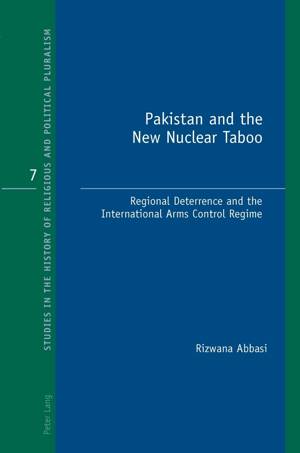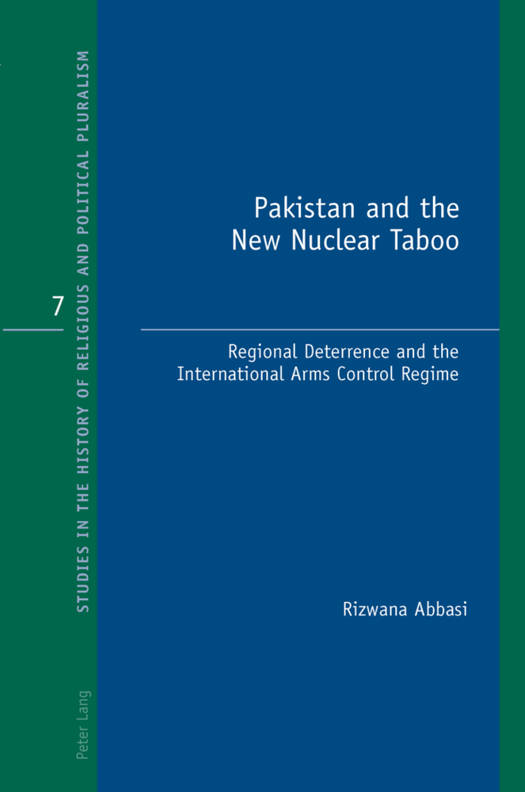
Bedankt voor het vertrouwen het afgelopen jaar! Om jou te bedanken bieden we GRATIS verzending (in België) aan op alles gedurende de hele maand januari.
- Afhalen na 1 uur in een winkel met voorraad
- In januari gratis thuislevering in België
- Ruim aanbod met 7 miljoen producten
Bedankt voor het vertrouwen het afgelopen jaar! Om jou te bedanken bieden we GRATIS verzending (in België) aan op alles gedurende de hele maand januari.
- Afhalen na 1 uur in een winkel met voorraad
- In januari gratis thuislevering in België
- Ruim aanbod met 7 miljoen producten
Zoeken
Pakistan and the New Nuclear Taboo; Regional Deterrence and the International Arms Control Regime
Regional Deterrence and the International Arms Control Regime
Abbasi Rizwana
€ 169,45
+ 338 punten
Omschrijving
This book examines Pakistan's nuclear behaviour from the 1950s onwards against the background of the emerging global non-proliferation system. The author probes the broader questions of the extent to which Pakistan's conduct was factored into the global non-proliferation regime and why that regime failed to constrain Pakistan's choice to go nuclear.
The book goes on to argue that in order to fully understand Pakistan's nuclear policy, the Indian case must also be considered. Therefore, this book provides a comprehensive scholarly account of the history of both India's and Pakistan's technological developments leading to their decision to develop nuclear weapons and confront the NPT constraints. The question of nuclear proliferation by Pakistan's most prominent scientist, Dr A. Q. Khan, its nuclear behaviour after the disclosure of this proliferation case, and the recent development of counter-proliferation measures at a global level are all analysed in this volume. The security of Pakistan's nuclear weapons and the question of the state's reliability within the ranks of the global community remain hotly debated issues. Pakistan and the New Nuclear Taboo offers the compelling argument that a new nuclear taboo against proliferation has emerged to prevent nuclear risks regionally and globally: since 2004, it is argued, Pakistan has played a key role in helping to establish this new nuclear taboo against the proliferation of nuclear weapons. The 'three models' approach adopted here provides the most comprehensive and up-to-date theoretical perspective on Pakistan's nuclear behaviour and helps illuminate nuclear policy dynamics and the role of international institutions in regulating the conduct of states in other regions as well.
The book goes on to argue that in order to fully understand Pakistan's nuclear policy, the Indian case must also be considered. Therefore, this book provides a comprehensive scholarly account of the history of both India's and Pakistan's technological developments leading to their decision to develop nuclear weapons and confront the NPT constraints. The question of nuclear proliferation by Pakistan's most prominent scientist, Dr A. Q. Khan, its nuclear behaviour after the disclosure of this proliferation case, and the recent development of counter-proliferation measures at a global level are all analysed in this volume. The security of Pakistan's nuclear weapons and the question of the state's reliability within the ranks of the global community remain hotly debated issues. Pakistan and the New Nuclear Taboo offers the compelling argument that a new nuclear taboo against proliferation has emerged to prevent nuclear risks regionally and globally: since 2004, it is argued, Pakistan has played a key role in helping to establish this new nuclear taboo against the proliferation of nuclear weapons. The 'three models' approach adopted here provides the most comprehensive and up-to-date theoretical perspective on Pakistan's nuclear behaviour and helps illuminate nuclear policy dynamics and the role of international institutions in regulating the conduct of states in other regions as well.
Specificaties
Betrokkenen
- Auteur(s):
- Uitgeverij:
Inhoud
- Aantal bladzijden:
- 355
- Taal:
- Engels
- Reeks:
- Reeksnummer:
- nr. 7
Eigenschappen
- Productcode (EAN):
- 9783034302722
- Verschijningsdatum:
- 26/05/2012
- Uitvoering:
- Paperback
- Formaat:
- Trade paperback (VS)
- Afmetingen:
- 145 mm x 221 mm
- Gewicht:
- 521 g

Alleen bij Standaard Boekhandel
+ 338 punten op je klantenkaart van Standaard Boekhandel
Beoordelingen
We publiceren alleen reviews die voldoen aan de voorwaarden voor reviews. Bekijk onze voorwaarden voor reviews.









